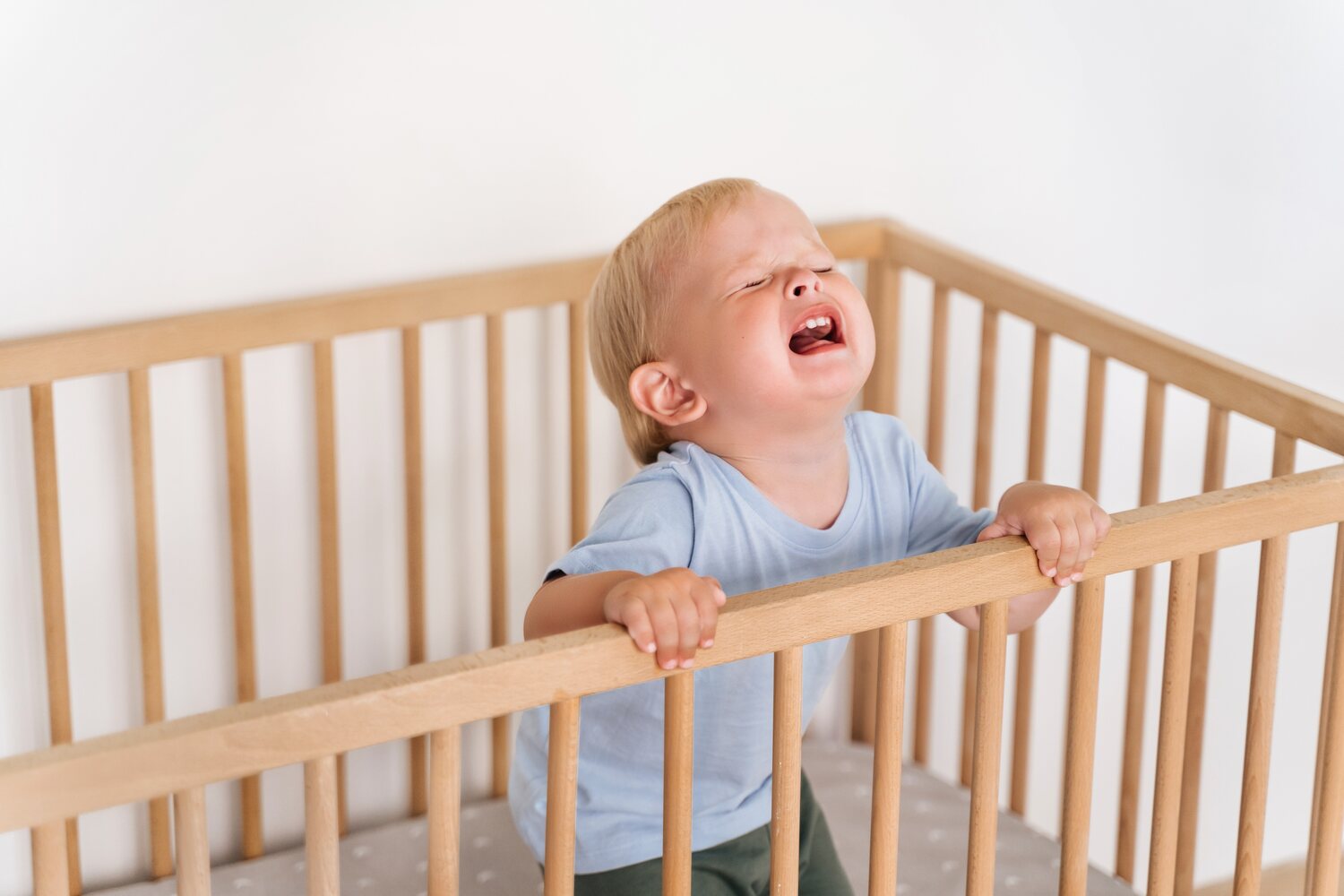
Imagine you’re at a friend’s place and your toddler spotted a toy and wishes to take it. However it belongs to your friend’s tiny one. Suddenly you may find yourself in a scenario where your toddler throws a full-fledged temper tantrum that is both annoying and embarrassing.
These emotional meltdowns may prompt a question “When should you give in to your toddler’s tantrum?” Due to their limited emotional regulation skills, tantrums are common among toddlers. By showing understanding and empathy, we can help them learn to express their feelings in more socially acceptable ways, reducing the frequency and intensity of these outbursts.
In This Article
- What is a Temper Tantrum?
- Signs of Temper Tantrum in Kids
- Tantrum Triggers
- Why do Toddlers Have Tantrums?
- How Not to React to Your Toddler’s Temper Tantrums?
- When Should You Give in to Toddler Tantrums?
- FAQ’s
What is a Temper Tantrum?

A temper tantrum is an emotional outburst or meltdown, usually involving screams and shouts, crying, or physical display of anger. The toddler displays extreme frustration and anger when things do not turn out as they had expected. Some of them may resort to hitting, kicking, banging their head on the floor out of a tantrum episode.
Tantrums are a common developmental issue and slowly fades out as a toddler matures (1). You may find your toddler showing one or two episodes of such behavior in their everyday life. As a parent, you need to understand the fact that temper tantrums are due to lack of emotional regulation in toddlers. Since the tiny tot doesn’t have enough words to express their feelings, they feel misunderstood or not heard to. Therefore they resort to curling up on the floor, or throw objects just to gather your attention.
Temper tantrum may start when your toddler reaches 2 years, usually escalating by 3. However, it may also show up in 12 months as well. 87% toddlers show tantrums in 18-24 months at least once in a day (2).
Signs of Temper Tantrum in Kids

Temper tantrums involve a range of physical and emotional expressions that manifest frustration, annoyance, and anger of your toddler. During a tantrum, they may show one, two, or many of these signs as explained here –
- Intense screaming
- Loud cries
- Physical aggression such hitting, kicking, rolling on the floor
- Verbally defying parents’ requests
- Clenched fists
- Tensed body posture
- May break objects
- Tries to bite toys or throw them aimlessly
- Holds breath
Tantrum Triggers

Tantrum triggers refer to temperamental and environmental factors that leads to tantrum episodes all of a sudden. Triggers are individualized and vary from one toddler to the other. Some of the immediate triggers of tantrums can be –
- Feelings of hunger
- Toddler wants to sleep and cannot do so on their own
- Feeling frustrated as they cannot explain their needs and wants to the parent
- Feeling disappointed when they cannot get what they want
- Physical discomfort – may need a diaper change or wants to convey message of a physical pain
- Loud noise, over crowded social places may lead to tantrums
- Exposure to unfamiliar people or situations
- Feeling helpless and agitated when not seeing parent
Why do Toddlers Have Tantrums?

In toddlers, tantrums may occur due to several reasons. They may show manipulative tantrums when they want something from you but fail to achieve it. In this, they may try to force you to change your mind by behaving in annoying ways.
Manipulative tantrums lead to excessive crying, screaming, hitting, sitting and rolling on the floor etc. This tantrum type aims to control you in subtle ways. This type of tantrum is common. About 87.3% toddlers show manipulative tantrums (3).
Another type of tantrum is frustration tantrums that involve their inability to express feelings and thereby leading to breakdown of self-control leading to a tantrum episode. Toddlers may have tantrums because of the following reasons –
- Frustration due to limited communication
- Inability to regulate emotions effectively
- Anger for not being able to achieve a goal or solve a problem
- Anxiety due to separation from caregiver
- Observed aggressive behavior of siblings or older kids
- Change in daily routine that they are finding uncomfortable
How Not to React to Your Toddler’s Temper Tantrum?

As parents you’re aware of the fact that when temper tantrums occur, you need to keep calm and try to resolve the issue with tact and patience. However, your moves may go wrong if you give in to the heat of the moment you’re experiencing deep inside you. There are certain behaviors that you should never do as a parent, when tantrums are on-
- Never respond with the same aggressive manner by either spanking or chiding the toddler. Remember they’re watching your responses
- Avoid giving up to the tantrum as it may message the toddler that they will get things done by being angry or manipulative
- Ignoring the tantrum completely needs to be avoided as it can reinforce similar response from your toddler in public settings
- Never invalidate their concerns. Instead ask them what happened and how you can help them
- Avoid shaming, comparing, or criticizing them with others or in front of other toddlers
- Never tell them that their behavior is making you sad. This blackmail may backfire on you in course of time. Instead be firm yet polite with what you expect from them
When Should You Give in to Toddler Tantrums?

For toddlers, tantrums happen when they feel overwhelmed by strong feelings. They cannot verbalize these feelings clearly. As a result, they either cry or scream, or bang things on the floor, just to express their agony. At this juncture parents need to keep calm and model an absolute controlled behavior. You should give in to toddler tantrums if –
- Temper tantrums are a regular, persistent affair in daily life
- If safety of your toddler or others involved is a concern and giving in ensures safety
- When temper outbursts are related to meeting a legitimate need, such as hunger, sleep, or catering to toilet needs
- When toddler is genuinely feeling distressed
- If the toddler appears sick or tired, or displaying signs of physical pain, you should intervene for support
- If the toddler is stuck in a difficult situation and screams for assistance
Temper tantrums in toddlers are a normal thing, stemming from their struggle to regulate emotions and assert independence. Understanding triggers and responses is key for caregivers to effectively manage these behaviors. By offering empathy, setting boundaries, and teaching coping strategies, parents can help them develop essential skills.
FAQ’s
1. Is it Normal For Toddlers to Have Multiple Tantrums a Day?
Yes it is normal for toddlers to have multiple tantrums a day. This happens because they’re learning to navigate their emotions and trying to get connected with others in their surroundings. Moreover, tantrums are common developmental issues and it resolves all by itself as they mature.
2. How do I Stop my Toddler From Having Tantrums?
You can help your toddler manage emotions by teaching simple coping strategies like deep breathing or using words instead of strong feelings. Provide a consistent routine and validate their feelings to reduce tantrums and encourage positive behavior.
3. At What Age do Tantrums Subside?
Temper tantrums typically decrease in frequency and intensity as a toddler ages. With better emotional regulation, toddlers’ tantrums subside. However, it can vary depending on individual development and circumstances.
4. Are Temper Tantrums Healthy?
If tantrums are once in a while and not regular, there is nothing to worry. However, if it’s persistent and interferes with the tiny tot’s healthy emotional development, then it needs to be corrected right away.
5. Do Kids Remember Tantrums?
Most toddlers do not remember the specific memories related with a tantrum episode. However, they do remember how they felt if they encountered a similar situation later on.
References
- Temper Tantrums in Toddlers and Preschoolers: Longitudinal Associations with Adjustment Problems – [https://www.ncbi.nlm.nih.gov/pmc/articles/PMC9462137/]
- Temper Tantrums – [https://www.ncbi.nlm.nih.gov/books/NBK544286/]
- Assessment of Temper Tantrums Behaviour Among Preschool Children in Jordan – [https://www.sciencedirect.com/science/article/abs/pii/S088259632100049X]
